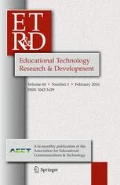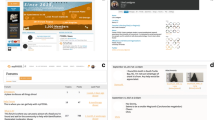Abstract
In order to seek more effective ways to design and support online communities of practice, we examined how Wikipedia, a large-scale online community of practice, is developed and emerges over time. We conducted a Delphi study to explore the social, organizational, and technical factors that Wikipedia experts believe have supported the evolution of this community. Based on the findings, we present a model for thinking about online communities of practice and suggest it may serve as starting point to develop strategies of designing and supporting online communities of practice.







Similar content being viewed by others
References
Adler, B. T., & de Alfaro, L. (2007). A content-driven reputation system for the Wikipedia. In Proceedings of the sixteenth international World Wide Web conference (pp. 261–270). New York: ACM.
Adler, M., & Ziglio, E. (1996). Gazing into the oracle. Bristol, PA: Jessica Kingsley Publishers.
Alexa.com. (2009). Related info for: wikipedia.org. Retrieved from http://www.alexa.com/data/details/traffic_details?q=&url=http://en.wikipedia.org.
Barab, S. A., & Duffy, T. (2000). From practice fields to communities of practice. In D. Jonassen & S. M. Land (Eds.), Theoretical foundations of learning environments. Mahwah, NJ: Lawrence Erlbaum Associates.
Barab, S. A., Kling, R., & Gray, J. H. (2004). Designing for virtual communities in the service of learning. Cambridge: Cambridge University Press.
Benkler, Y. (2002). Coase’s penguin, or, linux and the nature of the firm. The Yale Law Journal, 12(3), 369–444.
Blumer, H. (1969). Symbolic interactionism: Perspective and method. Berkeley, CA: University of California Press.
Brown, J. S., Collins, A., & Duguid, P. (1989). Situated cognition and the culture of learning. Educational Researcher, 18(1), 32–42.
Brown, J. S., & Duguid, P. (1991). Organizational learning and communities of practice: Toward a unified view of working, learning, and innovation. Organizational Science, 2(1), 40–57.
Bryant, S., Forte, A., & Bruckman, A. (2005). Becoming Wikipedian: Transformation of participation in a collaborative online encyclopedia. In Proceedings of the 2005 international ACM SIGGROUP conference on supporting group work (pp. 1–10). New York: ACM.
Burnett, G. (2000). Information exchange in virtual communities: A typology. Information Research, 5(4). Retrieved from http://informationr.net/ir/5-4/paper82.html.
Butler, B., Joyce, E., & Pike, J. (2008). Don’t look now, but we’ve created a bureaucracy: the nature and roles of policies and rules in Wikipedia. In CHI 08: Proceeding of the twenty-sixth annual SIGCHI conference on human factors in computing systems (pp. 1101–1110). New York: ACM.
Chesney, T. (2006). An empirical examination of Wikipedia’s credibility. First Monday, 11 (11). Retrieved from http://firstmonday.org/.
Ciffolilli, A. (2003). Phantom authority, self-selective recruitment and retention of members in virtual communities: The case of Wikipedia. First Monday, 8(12). Retrieved from http://firstmonday.org/.
Dalkey, N., & Helmer, O. (1963). An experimental application of the Delphi method to the use of experts. Management Science, 9(3), 458.
Delberg, A. L., Van de Ven, A. H., & Gustafson, D. H. (1975). Group techniques for program planning. Glenview, IL: Scott Foresman.
Denzin, N. (2006). Sociological methods: A sourcebook. Piscataway, NJ: Transaction Publishers.
Dodge, B. J., & Clark, R. (1977). Research on the Delphi technique. Educational Technology, 17(4), 58–60.
Eggers, R. M., Ohio, H., & Jones, C. M. (1998). Practical considerations for conducting Delphi studies: The oracle enters a new age. Educational Research Quarterly, 21(3), 53–66.
Fazio, L. S. (1985). The Delphi: Education and assessment in institutional goal setting. Assessment and Evaluation in Higher Education, 10(2), 147–158.
Giles, J. (2005). Internet encyclopaedias go head to head. Nature, 438, 900–901.
Greeno, J. G. (1998). The situativity of knowing, learning, and research. American Psychologist, 53, 5–26.
Herrmann, F. (1998). Building on-line communities of practice: An example and implications. Educational Technology, 38(1), 16–23.
Hoadley, C. M., & Kilner, P. G. (2005). Using technology to transform communities of practice into knowledge-building communities. SIGGROUP Bulletin, 25(1), 31–40.
Hung, D., & Chen, D. T. (2002). Understanding how thriving internet quasi-communities work: Distinguishing between learning about and learning to be. Educational Technology, 42(1), 23–27.
Ingawale, M., Dutta, A., Roy, R., & Seetharaman, P. (2009). The small worlds of Wikipedia: Implications for growth, quality and sustainability of collaborative knowledge networks. In Proceedings of the 15th Americas conference on information systems. Retrieved from http://aisel.aisnet.org/amcis2009/439/.
Johnson, C. M. (2001). A survey of current research on online communities of practice. Internet and Higher Education, 4, 45–60.
Katz, E., Blumler, J. G., & Gurevitch, M. (1973). Uses and gratifications research. Public Opinion Quarterly, 37, 509–523.
Kittur, A., Chi, E. H., Pendleton, B. A., Suh, B., & Mytkowicz, T. (2007, April). Power of the few vs. wisdom of the crowd: Wikipedia and the rise of the bourgeoisie. Paper presented at the 25th annual ACM conference on human factors in computing systems, San Jose, CA. Retrieved from http://www.parc.com/publication/1749/power-of-the-few-vs-wisdom-of-the-crowd.html.
Kittur, A., & Kraut, R. E. (2008). Harnessing the wisdom of crowds in wikipedia: Quality through coordination. In Proceedings of the ACM 2008 conference on computer supported cooperative work (pp. 37–46). New York: ACM.
Kollock, P. (1999). The economies of online cooperation: Gifts and public goods in cyberspace. In M. Smith & P. Kollock (Eds.), Communities in cyberspace. London: Routledge.
Lave, J., & Wenger, E. (1991). Situated learning: Legitimate peripheral participation. Cambridge: Cambridge University Press.
Linstone, H. A., & Turoff, M. (1975). The Delphi method: Techniques and applications. Reading, MA: Addison-Wesley.
Long, H. (1991). Continuing higher education research futures: A Delphi study of professors of adult education. Journal of Continuing Higher Education, 39(2), 29–35.
McMillan, D. W., & Chavis, D. M. (1986). Sense of community: A definition and theory. Journal of Community Psychology, 14, 6–23.
Merriam, S. B. (2001). Qualitative research and case study applications in education. San Francisco, CA: Jossey-Bass.
Murry, J. W., & Hammons, J. O. (1995). Delphi: A versatile methodology for conducting qualitative research. The Review of Higher Education, 18, 423–436.
Nov, O. (2007). What motivates Wikipedians, or how to increase user-generated content contribution. Communications of the ACM, 50, 60–64.
Panciera, K., Halfaker, A., & Terveen, L. (2009). Wikipedians are born, not made: A study of power editors on Wikipedia. In Proceedings of the ACM 2009 international conference on supporting group work (pp. 51–60). New York: ACM.
Patton, M. Q. (2002). Qualitative research and evaluation methods. Thousand Oaks, CA: Sage.
Peddibhotla, N. B., & Subramani, M. R. (2007). Contributing to public document repositories: A critical mass theory perspective. Organization Studies, 28, 327–346.
Pollard, C., & Pollard, R. (2005). Research priorities in educational technology: A Delphi study. Journal of Research on Technology in Education, 37(2), 145–160.
Rafaeli, S., & Ariel, Y. (2008). Online motivational factors: Incentives for participation and contribution in Wikipedia. In A. Barak (Ed.), Psychological aspects of cyberspace: Theory, research, applications (pp. 243–267). Cambridge: Cambridge University Press.
Raskin, M. S. (1994). The Delphi study in field instruction revisited: Expert consensus on issues and research priorities. Journal of Social Work Education, 30(1), 75–89.
Resnick, L. B. (1987). Learning in school and out. Educational Researcher, 16, 13–20.
Rheingold, H. (1993). The virtual community: Homesteading on the electronic frontier. Reading, MA: Addison-Wesley.
Riehle, D. (2006). How and why Wikipedia works: An interview with Angela Beesley, Elisabeth Bauer, and Kizu Naoko. In Proceedings of the 2006 international symposium on wikis (pp. 3–8). New York: ACM.
Ritchie, D., & Earnest, J. (1999). The future of instructional design: Results of a Delphi study. Educational Technology, 39(1), 35–42.
Rosenzweig, R. (2006). Can history be open source: Wikipedia and the future of the past. Journal of American History, 93(1), 117–146.
Schwen, T. M., & Hara, N. (2004). Community of practice: A metaphor for online design? In S. A. Barab, R. Kling, & J. H. Gray (Eds.), Designing for virtual communities in the service of learning. Cambridge: Cambridge University Press.
Schwier, R. A. (2001). Catalysts, emphases and elements of virtual learning communities: Implications for research and practice. The Quarterly Review of Distance Education, 2(1), 5–18.
Stalder, F., & Hirsh, J. (2002). Open source intelligence. First Monday, 7 (6). Retrieved from http://firstmonday.org/.
Thom-Santelli, J., Cosley, D. R., & Gay, G. (2009). What’s mine is mine: territoriality in collaborative authoring. In CHI 07: Proceedings of the 27th international conference on human factors in computing systems (pp. 1481–1484). New York: ACM.
Viégas, F. B., Wattenberg, M., & Dave, K. (2004). Studying cooperation and conflict between authors with history flow visualizations. In CHI 04: Proceedings of the SIGCHI conference on human factors in computing systems (pp. 575–582). New York: ACM.
Viégas, F., Wattenberg, M., Kriss, J., & van Ham, F. (2007). Talk before you type: Coordination in Wikipedia. In Proceedings of the 40th annual hawaii international conference on system sciences (pp. 78a). Los Alamitos, CA: IEEE Computer Society Press.
Viégas, F. B., Wattenberg, M., & McKeon, M. M. (2007b). The hidden order of Wikipedia. In Online communities and social computing (pp. 445–454). New York: Springer.
Vygotsky, L. S. (1978). Mind in society: The development of higher mental process. Cambridge, MA: Harvard University Press.
Wenger, E. (1998). Communities of practice: Learning, meaning and identity. Cambridge: Cambridge University Press.
Wikipedia. (2008). Wikipedia in academic studies. Retrieved from http://en.wikipedia.org/wiki/Wikipedia:Wikipedia_in_academic_studies.
Wikipedia. (2009). Wikipedia: Ownership of articles. Retrieved from http://en.wikipedia.org/wiki/Wikipedia:Ownership_of_articles.
Wilkinson, D. M., & Huberman, B. A. (2007). Cooperation and quality in wikipedia. In Proceedings of the 2007 international symposium on wikis (pp. 157–164). New York: ACM.
Author information
Authors and Affiliations
Corresponding author
Appendix
Appendix
Informational questionnaire
-
1.
Gender [pull-down]
-
2.
Age [pull-down]
-
3.
Which country do you live in? [pull-down]
-
4.
What is your profession? [fill-in]
-
5.
Are you a Wikipedia editor? [yes/no pull-down]
-
a.
If yes, how long have you been an editor? [pull-down: 0–1 year, 1 < 2 years, 2 < 3 years, 3 < 4 years, 4 < 5 years, more than 5 years]
-
b.
If yes, how often do you edit? [pull-down: once or twice a year, once a month, once a week, once a day, several times a day]
-
a.
-
6.
Are you a Wikipedia administrator? [yes/no pull-down]
-
a.
If yes, for how long have you been serving as an administrator? [pull-down: 0–1 year, 1 < 2 years, 2 < 3 years, 3 < 4 years, 4 < 5 years, more than 5 years]
-
b.
If yes, what is your responsibility as an administrator? [fill-in]
-
a.
-
7.
Have you participated in Wikipedia projects in ways other than editing and administrating? [yes/no pull-down].
-
8.
If yes, in what other ways have you participated? [fill-in]
-
9.
Please describe your Wikipedia research interests: [fill-in]
-
10.
Please describe your Wikipedia research experience to date (studies conducted, results presented, publications, and the like): [fill-in]
-
11.
Which language version of Wikipedia do you use the most? [pull-down]
Rights and permissions
About this article
Cite this article
Zhao, X., Bishop, M.J. Understanding and supporting online communities of practice: lessons learned from Wikipedia. Education Tech Research Dev 59, 711–735 (2011). https://doi.org/10.1007/s11423-011-9204-7
Published:
Issue Date:
DOI: https://doi.org/10.1007/s11423-011-9204-7




